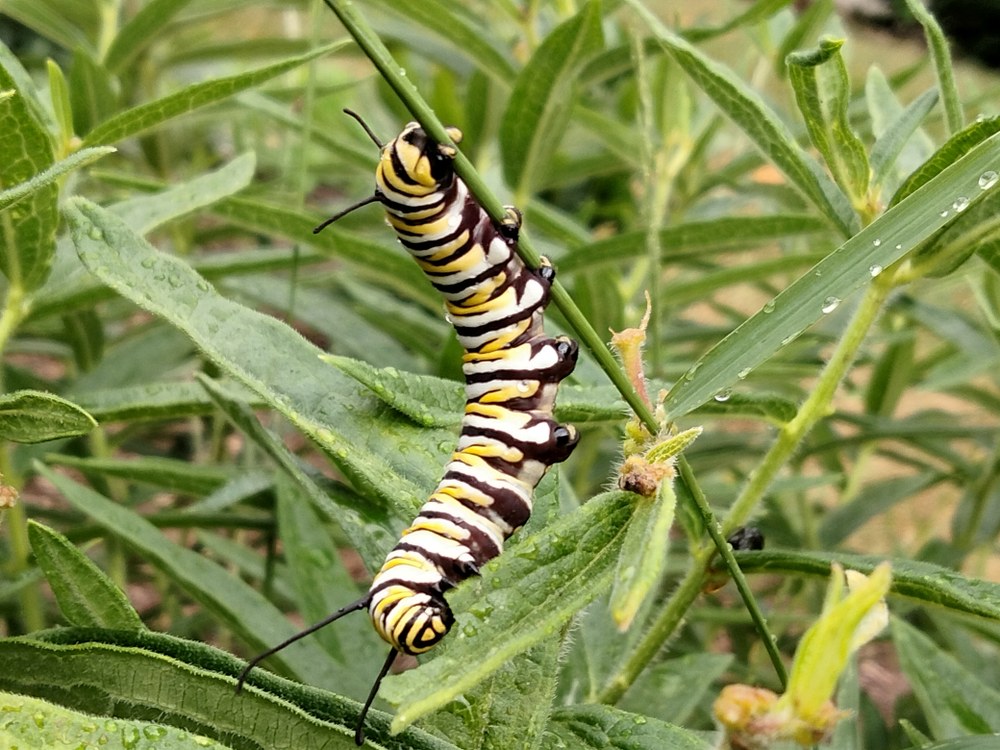The Pollinator Friendly Garden Project at the Wyoming County Fairgrounds was funded in part by the Wyoming County Room Tax Fund and the Endless Mountains Visitors Bureau.

A monarch caterpillar on butterfly weed (Asclepias tuberosa).
The Penn State Extension Master Gardeners of Wyoming County permanent exhibit area at the Wyoming County Fairgrounds was once a highlight of the annual County Fair for many visitors and a source of pride for the Master Gardeners. Over the last several years, limited staff, stagnant volunteer growth, and pandemic restrictions left the garden exhibit area underused and overgrown. In Fall 2020, the Wyoming County program recruited twice as many Master Gardener trainees as the previous year. Fall 2021 recruitment efforts surpassed 2020, poising the Master Gardeners to revitalize the exhibit. The Master Gardeners are taking action to protect pollinators by transforming the garden exhibit into a Certified Pennsylvania Pollinator Friendly Garden.
Pollinators need help. Populations of pollinators, including native and domestic bees, flies, beetles, and butterflies are declining, affected by habitat loss, disease, and pesticide contact. Pollinating insects are vital to facilitating pollination, the transfer of pollen from the anthers of a flower to the stigma of the same or a different flower. According to the United States Department of Agriculture, approximately one-third of all agricultural output depends on pollinators. Encouraging pollinators leads to increased yields and higher quality crops that, in turn, benefit growers and consumers.
The Penn State Extension Certified Pollinator Friendly Garden program began in 2011 to educate and encourage Pennsylvanians to help pollinators by incorporating native trees, shrubs, flowers, and host plants for butterfly larvae in home landscapes. The program has certified over 1,000 Pollinator Friendly Gardens in the state, including three in Wyoming County. Certifiable gardens must provide pollinators food, water, and shelter and safeguard the habitat by removing invasive species and reducing pesticide use.
The Pollinator Friendly Garden Project demonstrates to visitors of the Wyoming County Fair how they can incorporate native flowers and host plants into their home landscapes to help attract and support native pollinators. It also showcases the strong relationship between pollinators and agriculture, the centerpiece of the annual Wyoming County Fair. The Pollinator Friendly Garden Project debuted at the Fair in 2022.
The four steps taken by Master Gardeners to create the Pollinator Friendly Garden Project are described in the below articles. For additional information on Penn State Extension's Pennsylvania Pollinator Friendly Garden certification, please visit: Pollinator Garden Certification -- Department of Entomology (psu.edu)
Identifying invasive plant species and developing a plan to remove them is a crucial step in creating a Certified Pennsylvania Pollinator Friendly Garden.
Providing a water source for pollinators is a key step in creating a Certified Pennsylvania Pollinator Friendly Garden.
Research shows that native pollinators are attracted to native plants four times more than non-natives. Certified Pennsylvania Pollinator Friendly Gardens incorporate a variety of native trees, shrubs, and flowers that support native pollinator nutrition.
Providing nesting and overwintering sites for pollinators is a requirement in the creation of a Certified Pennsylvania Pollinator Friendly Garden.

